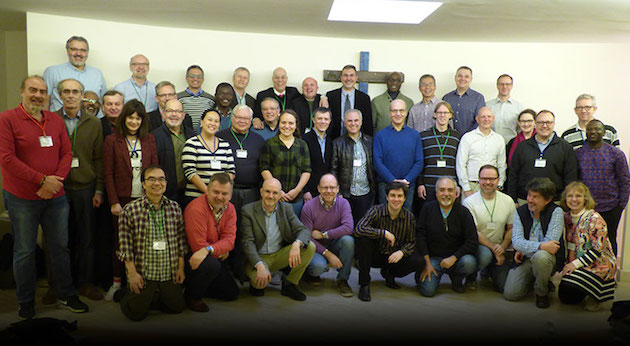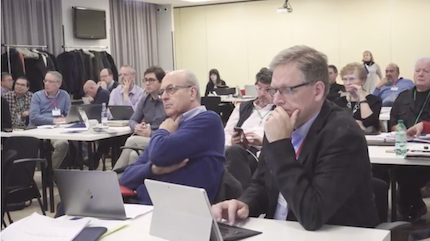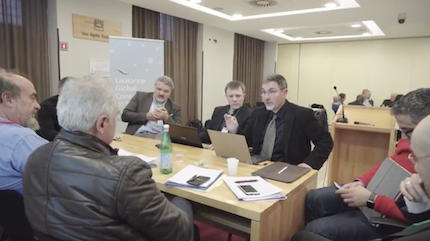Jaume Llenas, a member of the committee that wrote the Lausanne document “The Missing ‘Christians’: A Global Call”, explains how nominalism is affecting the Evangelical church.
 Participants of the conference about nominalism in Rome. / Lausanne Movement
Participants of the conference about nominalism in Rome. / Lausanne Movement
What is a nominal Christian? The Lausanne Movement has defined it as “people who identify with a Christian church or faith, but are in contradiction with basic Christian principles with respect to becoming a Christian, faith, beliefs, church involvement, and daily life”.
Under this definition, a world phenomenon is taking place - it’s not a new one but it is a matter of urgency for the church. At least, that’s what 40 evangelical pastors, theologians, missiologists and sociologists in Rome consider it to be, having met last March and developed the document, “The Missing ‘Christians’: A Global Call”, available for download from the movement’s website.
One of the members of the committee that produced this document is Jaume Llenas, General Secretary of the Spanish Evangelical Alliance and chairman of the Lausanne Movement in Spain.
In this interview, Llenas examines the phenomenon of nominalism throughout history and challenges the contemporary Spanish church to respond, emphasising a church model that makes relational discipleship a fundamental part of its strategy.
 Jaume Llenas, general secretary of the Spanish Evangelical Alliance and chairman of the Lausanne Movement in Spain. . / J. Soriano
Jaume Llenas, general secretary of the Spanish Evangelical Alliance and chairman of the Lausanne Movement in Spain. . / J. SorianoQuestion. What is the Lausanne Movement, and why is it addressing the issue of nominalism now?
Answer. The Lausanne Movement was initially founded by two people: Billy Graham and John Stott. They brought with them two important components: Graham represented the practical element of evangelism, and Stott represented the theologians of evangelism.
The movement began in 1966 with the first Congress held in Berlin, and kept growing, when in 1974, the International Congress on World Evangelization was held in the Swiss city of Lausanne.
From then on, reference documents began to emerge for the Church. Someone once said that the documents that came out of Lausanne are the most widely accepted documents in the Evangelical Church since the documents that came out of the early Church, from the first 300 years of Christianity.
There are three main documents: the Lausanne Covenant, the Manila Manifesto and the Cape Town Commitment, which came from the three big meetings. In between, sets of documents were put together by smaller groups that form the “occasional papers”, which capture more of the specifics.
Nominalism as an issue was already being worked on by the end of the 70s within the Lausanne Movement. There were groups that met to work on evangelising to nominal Catholics, Orthodox Christians and Protestants.
But on that occasion, nominalism from within the evangelical world wasn’t touched on. This is something new that we have been working on in 2018. So, what has changed between the 1970s to now, the year 2018? That is what we answer in this document.
Q. According to the document, almost a third of the world’s population defines themselves as “Christian”, however this “label” should be questioned. Why?
A. We analyseD nominalism from three perspectives: sociological, theological and missiological. But even by just defining what a nominal Christian is we encounter trouble, because it is such a broad concept that it is tricky to summarise.
So we were unpacking it and we were able to identify seven aspects of how someone might be “nominal”, for example, they might not have had a conversion experience. Or it could be that they don’t have a faith in Christ, and they hold onto beliefs that have nothing to do with Christianity; or because they haven’t identified themselves with any particular church; or because they don’t practically follow Christ in their daily life...
In these seven aspects there isn’t always a “yes” or a “no”, but varying degrees. When we’re facing nominalism, we can find people who have had pastoral problems, that haven’t been discipled to walk with Christ. Sometimes they are physically present in church, but they haven’t been followed up. That’s why we need to clarify these details.
Q. It also indicates that “nominal Christianity” undermines the testimony of the Church. Why is this?
A. From the year 300, we see the phenomenon known as Constantinism, when Christianity was made the official religion of the Roman Empire. Since then we have seen large numbers of people come into Christianity without having had a conversion experience; something that didn’t happen beforehand due to persecution - being Christian created a problem.
But when Constantine converted, it became a popular religion, so much so that thousands of people became part of the religion without having experienced Christ. These people continued to behave in the same way they had before, without Christ, and the only thing that had changed was the name they identified themselves with.
This is nominalism: the person who says they have a faith, but whose life doesn’t match up to the faith he claims to live out. And so people begin to behave with the same attitudes of the past, despite saying that they are Christians.
This is something that has continued for a long time within the Church. Today it manifests itself differently, for example in the prosperity gospel, secularism, colonialism, racism...
These are people who haven’t had the experience of a conversion to Christ. That is the scandal it produces for the Church's testimony, given that, within the Church, there are people who have had conversion experiences, but there are others who haven’t, and they continue with the patterns of the past.
 The consultation in Rome reviewed the responses of the church throughout history to the problem of nominalism. / Lausanne Movement
The consultation in Rome reviewed the responses of the church throughout history to the problem of nominalism. / Lausanne MovementQ. On a more general level, the document says that “nominal Christianity” is more problematic when Christianity is in a dominant or majority position. Could you give us some more solid examples?
A. When Christianity becomes ‘Christianism’ – and we have to differentiate between these two things: Christianity is a spiritual experience with Christ, a personal encounter that leads to change, where there is repentance and faith; but ‘Christianism’ only implies that you identify with some moral criteria of Christianity, even if you don’t practice it personally, but you think it could be good for society.
That is what happened for centuries in Spain, for example: to be Spanish was to be Christian, or Catholic more specifically. Thus, Spaniards were considered Catholic, but they had no experience of a conversion to Christ.
But even if someone hasn’t had an experience with Christ, his behaviour can still be relatively moral, but he isn’t really going to be Christian because he hasn’t experienced a life transformed by God. So even 40 years ago in our country, Christian morals were accepted; today we live in a post-Christian world, but that shows us that there is a large portion of people in society – hundreds of thousands – that would call themselves Christians, but have never had a real experience of Christ.
Q. The document makes a strong call to pray for those who call themselves Christian but have had no personal conversion experience. Does this emphasis owe itself to the fact that there are churches or denominations that are losing this focus?
A. In a way, it’s something that has been happening since the beginning of the Church. It is necessary to emphasise conversion. It isn’t the only principle, because there are people who have had an experience of Christ who have never been discipled.
So conversion is essential, but it isn’t the only thing to take into account. For example, growth in discipleship is also hugely important. Someone could have been born again in Christ, but being in an environment where there is no growth is like being stuck in a revolving door: they never move forward to have a transformative experience of Christ.
Sometimes it’s a question of pastoring them, they may never have been given the necessary attention, the principles to grow in the Christian life.There may be aspects of their life that haven’t been seen through a Christ-like perspective.
Many people have problems in terms of being corruptible on an economic level: they might be Christian, but they might still be holding onto parts of their old life because they don’t realise what it has to do with the Christian faith.
So it’s hugely important who I believe in, what I believe in, how growth happens, and there is no part of life that God isn’t involved in. So someone can be nominal in many ways: it could be that they haven’t made the connection between knowing Christ and progressing in faith.
Q. It’s also noted that there are “nominal Christians” in “every congregation, in every denominational tradition, theological current, generation, cultural context...”. Bearing that in mind, have you ever faced this issue in the past? Can we find any reference as to how other generations of Christians throughout history have dealt with this?
A. That was one of the discoveries we made at the Inquiry in Rome. We came with ideas, we’d written and presented documents on the subject. But God intervened and started to point to our own lives, asking us, “what are the specific ways in my life that I’m being nominal in my attitude towards God?”
Nominalism isn’t just in other people. When we put together the other works in Lausanne in the 70s, they focused on the nominalism among Catholics, Orthodox Christians and Protestants in general.
But it didn’t specifically focus on the evangelical movement. But we have realised that there are many forms of nominalism. How many in our churches and families started coming to church services and then, after a while, left?
When you ask them, they say they’re Evangelicals, but they don’t walk with Christ in their daily lives, they aren’t involved in God’s mission to bring others to Christ. That’s what we were seeing.
People who are in our congregations, seated in church and listening to the sermon on a Sunday without identifying what that means for their job, or for their thoughts. People who act or think like real hooligans in some areas of public life.Christianity hasn’t affected every area of their life; it’s more a place they go to every Sunday morning. It is so necessary that we are aware of this today. Maybe in the past we weren't.
It was interesting that during the inquiry, we stopped one night to hear how the Catholics were dealing with this issue. We had a professor from a Catholic university with us, and we realised that they have a huge problem with nominalism; they don’t identify it clearly.
They don’t clearly point to this issue, nor do they have a clear strategy. We also read a document by an Orthodox Christian, but they weren’t particularly aware either. Maybe we haven’t been aware either.
In Spain, given that Evangelicals come from a history of persecution, nominalism was less of a problem in the churches. However, once the persecution had stopped, we saw how nominalism surged. And maybe we haven’t been conscious of it, it’s difficult to say that a child of ours is only nominal.
We say, “oh, he has an awareness of God”, or “he’s a good person”, but really he has no connection to the church, he isn’t linked to God’s mission, he isn’t involved. But it’s hard to admit that we have a problem of nominal Christianity in the Church.
At the same time, we assume that those who sit in an evangelical church are Christians, and those that don’t, aren’t. But that’s a very superficial reality, it doesn’t demonstrate the truth of what’s happening in our churches. We need to face the problem, set with the task of converting, of pastoring, of discipling – and we must do it today.
Q. In Spain, what do you think should be most emphasised? In your opinion, what is the most relevant part – or parts – of this document for that context?
A. There is an important part: asking for forgiveness and praying. Asking for forgiveness is realising that there is a problem that we haven’t confronted properly. And one of the matters that we need to face now is discipleship. We never had it in the church model we were given.
We can highlight two aspects of discipleship: intentional and relational. In the past, we believed that people would grow in spirituality just by listening to the message on a Sunday morning. And that is important – preaching the gospel from the pulpit is essential, but it’s not enough to do only that.
There is a relational aspect, as well. It’s obvious that the Apostle Paul had a transforming relationship with the people around him. It’s obvious that the best role model we have – Jesus – chose to spend three intimate years with a relatively small group (a group of three, a group of twelve, and a group of 120) to whom he ministered specially.
He also ministered to large crowds, but he worked so that these people would internalise the model of Christian life in a way that could be reproduced. However, in the majority of churches, we haven’t received this model of Christianity, of making disciples through a relational way, being with them, and that is the biggest task of the leaders.
It isn’t the church’s administration, or only preaching, but rather other forms of teaching that show what Christianity is like in daily life. If that were to change in our churches, we would see a fenomenal change. When people enter into intentional, relational discipleship, it’s like putting them in a greenhouse! They grow exponentially.
This is what we are lacking in the church model that we use. But we see it in the Scriptures; that’s why I’ve given the examples of Jesus and Paul, and we could look at more examples of how they discipled both intentionally and relationally.
I believe this, which is in the document, would be the calling that could produce the most important change in the Church.
Q. Another of the final themes points to the Church of the immediate future: there is talk of training leaders to mobilise young people and empower the lay ministry. How can we apply that point to Spain?
A. There are two fundamental things to take from this: we have a generation of fantastic young leaders, a group of people who aren’t for the future, but for the now. They’re in their thirties and forties, and we have to enable them, and allow them to lead.
 Christianity ceases to be authentic when people assume some of its values, but do not live a true relationship with Christ that transforms their lives, explains the document. / Lausanne Movement
Christianity ceases to be authentic when people assume some of its values, but do not live a true relationship with Christ that transforms their lives, explains the document. / Lausanne MovementWe need to recognise the gifts that they have and prepare the ground for them to use those gifts in church. They are a gift from God for the Church. If we keep complaining about what we don’t have instead of making way for what God has given us, we will be preventing the Holy Spirit from working in his Church.
What gives me more hope for the future is not the people, but that the Holy Spirit is in the Church. He doesn’t only work in a small group of more visible leaders, well prepared people of great depth, with a deep spirituality; He also works in people that are in our churches, who fail to recognise that they are God’s provision for the present.
They are the leaders that we should be equipping and using now, and sometimes we fear them - we say, “let’s see what these young people are going to do”. If we don’t want to keep growing in nominalism, we should be training these young people, giving them space to work, mentoring them, helping them to get things right.
Then there is the second aspect; that of the lay leaders. The task of carrying out the mission must be done outside the church walls. We need to train people who are in the workplace – they are the ones closest to the millions of nominal Christians that live in our society.
We have to free them up and train them to carry out the mission. In his book, “Unfinished Business”, Gregory Odren says that the Reformation wanted to do two things: firstly, it wanted to put the Bible back into Church; secondly, it wanted to establish the universal priesthood of Christians, who are all ministers.
The Reformation triumphed in the first aspect, but failed in the second, says Ogden. The ministry has been kidnapped by the leaders, and we must return the ministry to the congregation, to the people.
Those who are called to be pastors or elders are not the only ones called to minister; rather, the ministry is for the whole congregation and for all places. It is essential, if we want to reach those who are ‘nominal’, that we free up these resources: the young people and the whole congregation.
When we train and send, as Jesus did, we will have made a significant difference to the impact that the gospel has on society, among the thousands of nominal Christians that are around us.
Read another interview on the topic with Lars Dahle.
You can read “The Missing ‘Christians’: A Global Call” on the Lausanne website.

Las opiniones vertidas por nuestros colaboradores se realizan a nivel personal, pudiendo coincidir o no con la postura de la dirección de Protestante Digital.
Si quieres comentar o